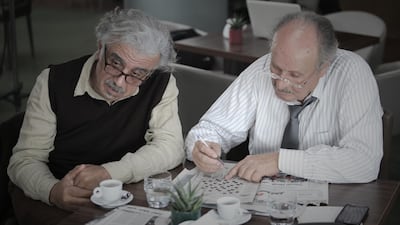Good Morning, playing in the Horizons of Arab Cinema competition at the Cairo Film Festival, is the new film by Lebanese director Bahij Hojeij, whose previous work, Here Comes The Rain, concerning the kidnappings during the Lebanese Civil War, won Best Arab Film at the Abu Dhabi Film Festival in 2010.
For Hojeij, it’s been a long seven years waiting to make another feature film.
"Unhappily, I've not been able to finance my other scripts," he says. This changed when he was sent a script by a friend, Rachid el-Daif, who asked if he would be interested in directing a film that told the story of two retired men, who meet at the same Beirut café for two hours every single morning to do the crossword, talk about their lives and discuss political events as a means to prevent the onset of Alzheimer's disease.
"I found the story and its use of a single location very inspiring because the script is very modern and interesting and that afforded me the opportunity to look at Lebanese society in an indirect way," the director says. "Also, it is a film that could be made with a modest budget."
The two writers then worked on the dialogue for months, honing the story that takes place over the course of 17 days so that it is split into three different aspects: life inside the café where the two men interact with each other and other customers; the neighbourhood that they can observe from the huge bay windows of the second-floor establishment; and then finally the world that infiltrates their lives through screens – television, computers or phones – by which they can hear news stories affecting society as a whole.
Hojeij wanted to look at the contradictions in Lebanese society through the eyes of two older men because, “it’s a perspective that we do not hear enough from in cinema and in general. It’s also an important part of society because we are living longer now and these two men have both lived in the past but also live in the present. So it was interesting to compare them with two younger characters, the male journalist who is 35 and the young waitress who is in her twenties”.
"The casting was really important because the film rests on the shoulders of the two characters, a general and an army doctor, one who is in his late 70s and the other who is 81 years old," Hojeij says.
Sadly, Adel Chahine, who plays the general in the film, died after filming finished. He had worked in the world of theatre in the 1970s and was the first to be cast in the film. The popular Lebanese actor Gabriel Yammine played the army doctor, and went on a diet to make himself look more than two decades older to play the role.
___________________
Read more:
The dark side of Mumbai: Tariq Khan on directing Mahesh Bhatt and tackling big issues
Young Syrian refugee actor meets Lady Gaga at Governors Awards
Saudi film ‘Amra and the Second Marriage' tackles a shift in tradition
___________________
While the film tackles some big contemporary issues, it has a light-hearted, comedic tone, which is in stark contrast to the two more dramatic and heavier fictional feature films that Hojeij previously directed.
"I chose to make a comedy because I didn't want to speak about retired people with a pathos and sadness," he says. "I wanted to show these characters as being full of life and recounting anecdotes and that they are not necessarily sad. I wanted to show them as happy."
In terms of shooting a story in the style of what the French call huis clos, made in one location, in a theatrical manner, with an emphasis on the psychological state of the characters rather than the plot, the film seems influenced by the work of Alfred Hitchcock and in particular Rear Window. But, Hojeij says, "I didn't really have a reference to a single film. To do a film in this style is delicate. You have one location and are running for an hour and a half so it's important not to bore the audience, especially when there is no huge plot.
“That’s why the actors have to grab the audience, be endearing and have our sympathy.”
And the director seems to have the same traits himself, signing off by saying, “Can you mention the music? It’s wonderful; it’s composed by my son Wissam.”
Good Morning ends its run at the Cairo Film Festival today


